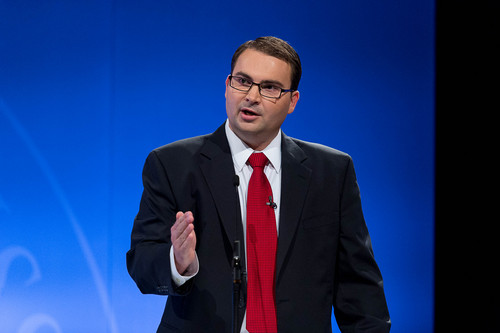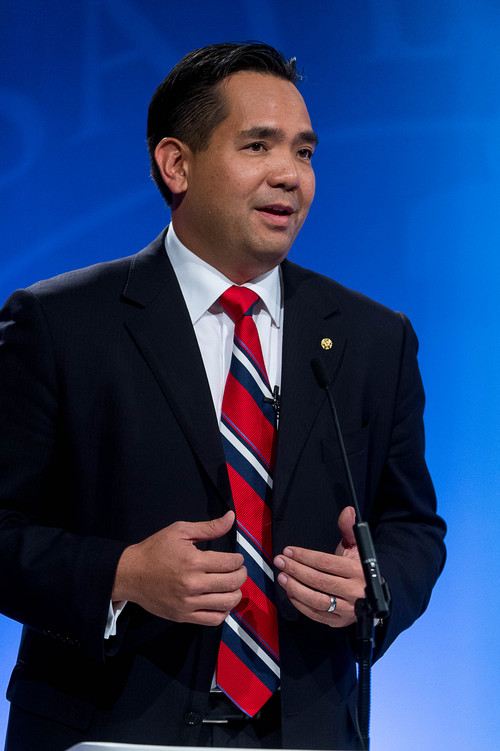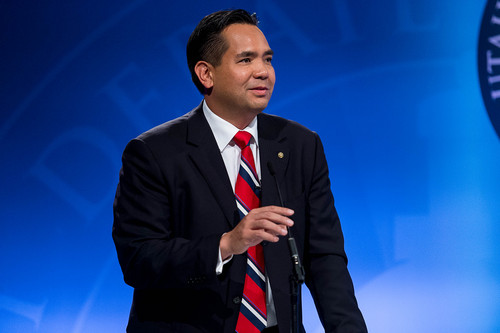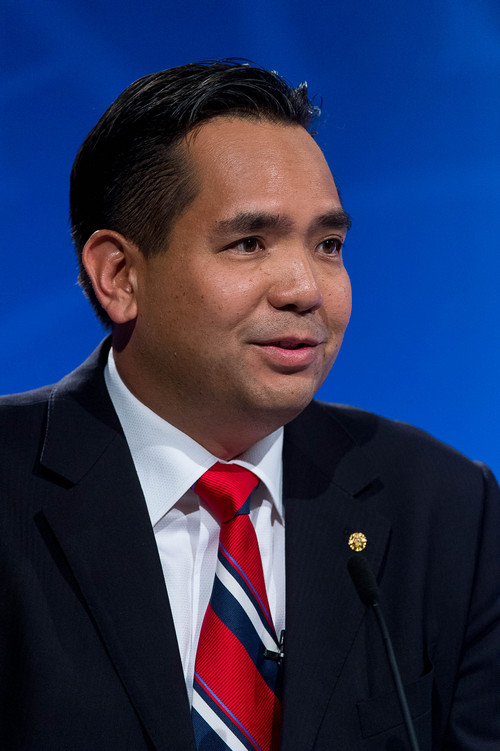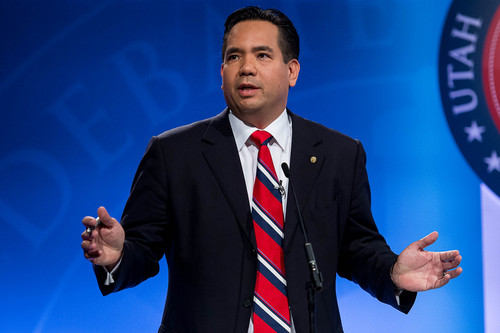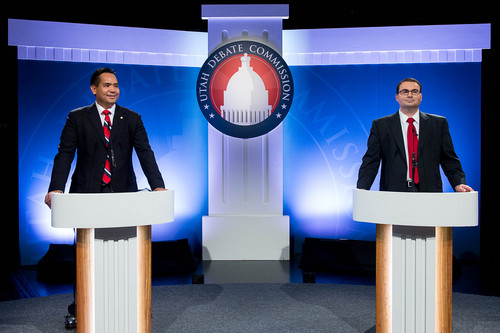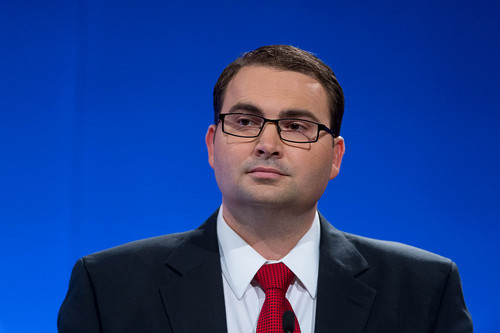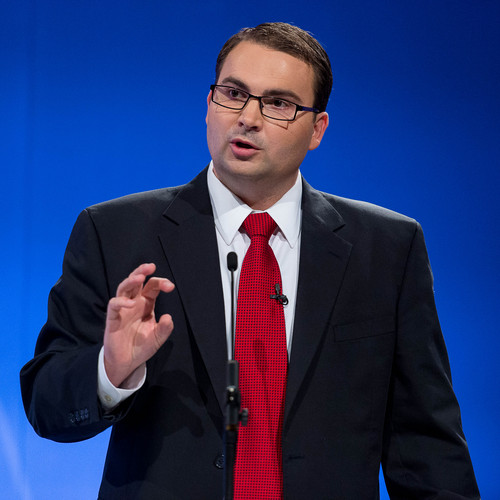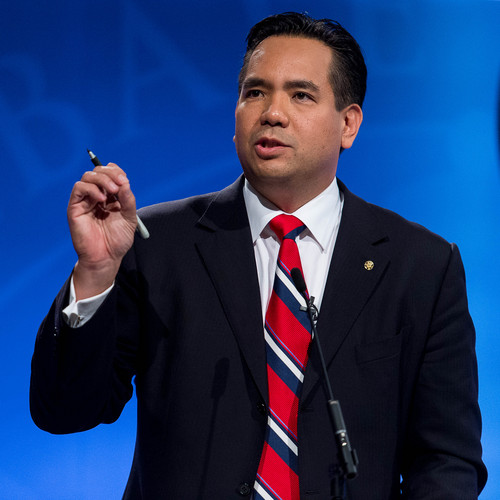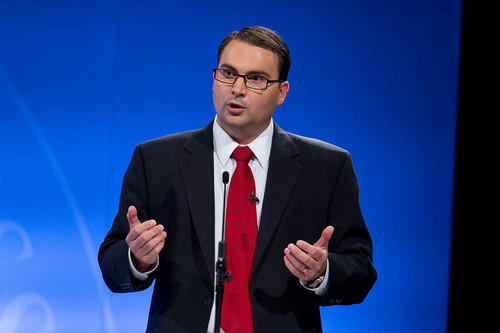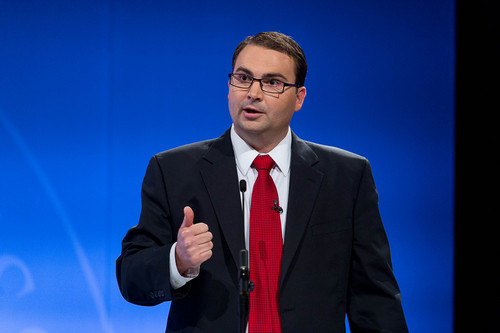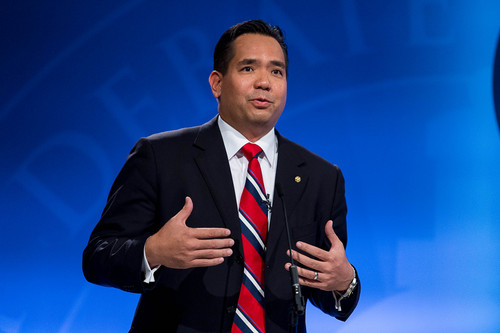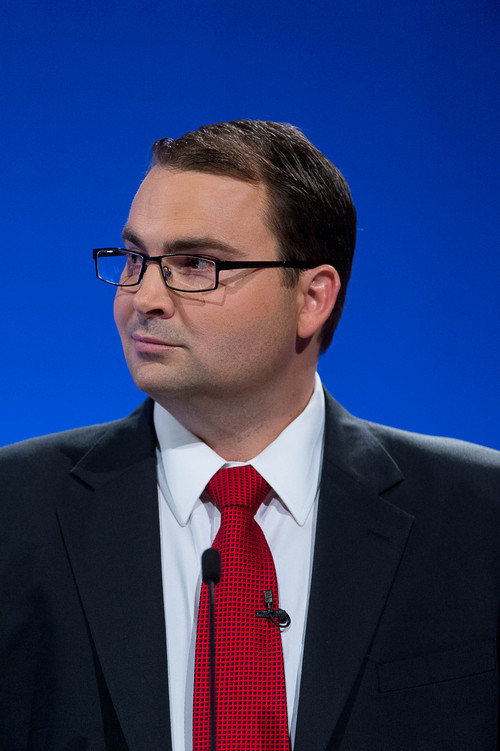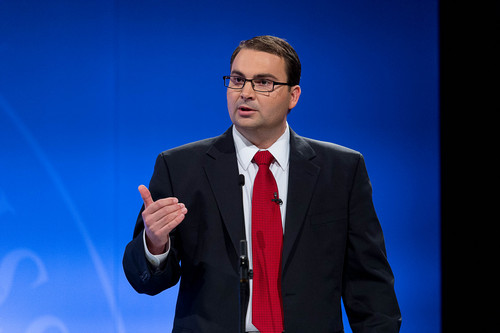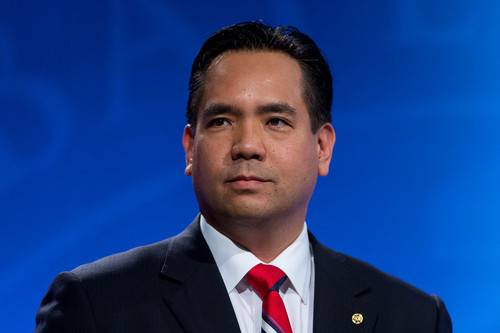This is an archived article that was published on sltrib.com in 2014, and information in the article may be outdated. It is provided only for personal research purposes and may not be reprinted.
Provo • Attorney General Sean Reyes' Democratic challenger, Charles Stormont, said Reyes hasn't done enough to reform the office in the aftermath of a massive scandal that drove his predecessor to resign.
"I am increasingly frustrated by the leadership crisis that has infected the attorney general's office," Stormont said during the first — and likely only — debate between the two contenders. "It's time to clean the office up with real reform, not six months from now, not a year from now, but right now."
Reyes defended the work he's done since being appointed to the office last December, replacing Attorney General John Swallow, who resigned less than a year into his term and has since been charged with 11 felonies alleging corruption during his tenure.
"Nine months ago, I inherited an office wracked with scandal and controversy," Reyes said. He said he has revamped the internal ethics office and established a public corruption unit to investigate and prosecute wrongdoing by public officials anywhere in the state.
"While there may have been a 'For Sale' sign before on the door of the attorney general's office," Reyes said, referring to a House investigation that determined Swallow sold access to the office, "there's a new sign since I've been here: 'Beware of dog.' "
Stormont said the office now has essentially the same structure as was in place when Swallow and his predecessor, Mark Shurtleff, allegedly abused their position, and real change is needed.
Stormont has proposed creation of an ethics office to provide guidance, take complaints from the public and investigate allegations of corruption against any Utah official.
"We have a serious problem. We count on the integrity of one person, [the attorney general], and we have seen in previous administrations what that system can bring us," Stormont said.
The candidates, speaking Wednesday at the Utah Debate Commission-sponsored debate at Brigham Young University, agreed that there should be limits on campaign contributions.
Stormont said he has unilaterally limited whose contributions he will accept, refusing money from multi-level marketers, payday lenders, alarm companies and online business marketing firms.
"I do believe this is an area where candidates can stand up and make a clear statement on where they're coming from," Stormont said. "Many [of those industries] receive thousands and thousands of complaints at the Department of Commerce and the attorney general is charged with assisting in those investigations. … Given that charge, we need to be able to take a good, hard objective look."
Reyes has not limited the size of contributions he will take — receiving many in excess of $10,000 — but said he has turned down donations from several individuals and businesses on a case-by-case basis, rather than painting entire industries with a broad brush.
The candidates also disagreed on the fundamental duty of the attorney general and whether the office had an obligation to defend Utah's constitutional amendment banning same-sex marriage.
Stormont argued that the attorney general is supposed to act as a check-and-balance, and the state shouldn't waste resources defending the marriage ban, which is likely unconstitutional, when the resources could be better spent on things like child protection and criminal appeals.
After the debate, he said some 40 cases have ruled that same-sex marriage bans are unconstitutional, and six appeals, including Utah's, are before the U.S. Supreme Court.
"We need to make clear when we pick one law and throw money at it, knowing we're going to lose, we ignore children who are in abusive situations," Stormont said.
Reyes said Stormont, like the U.S. Attorney General Eric Holder, seems to think "you can pick and choose which laws you want to defend based on your personal views."
"I say you can't cut and run. You can't thwart the democratic process because you're smarter than the Supreme Court," Reyes said. Doing so creates a dangerous precedent for the office to dictate policy, said Reyes, who said he took an oath to defend the laws of the state.
In fact, the oath is to defend the U.S. and Utah constitutions, and doesn't mention state laws. Utah's Amendment 3, the marriage ban, is a constitutional amendment.
Stormont was critical of Reyes for instituting a policy prohibiting staff from talking to reporters without permission, referred to as a gag rule. Those violating it could be fired.
"The only gagging that goes on is when the lawyers in my office hear my opponent use that term because it's not true," Reyes said.
Reyes changed the policy regarding staff speaking to reporters in March, after several embarrassing leaks from the office, specifically stating that anyone providing information to a reporter without permission could be reprimanded or fired.
Reyes has said other agencies and private industries have similar policies and employees still have whistleblower protections if they are speaking out about corruption or malfeasance.
Reyes criticized Stormont for going negative in his first set of radio ads that hit the airwaves Wednesday. Reyes said they took his comments out of context. Stormont said the ads show a clear contrast between himself and Reyes and listeners can make up their mind.
Twitter: @RobertGehrke —
Upcoming Utah Debate Commission matchups
3rd Congressional District • Rep. Jason Chaffetz, Brian Wonnacott, Oct. 7, 6 p.m. TV: ABC4, KBYU, KSL, KUED. Radio: KSL. Live-streaming: http://www.sltrib.com
4th Congressional District • Mia Love, Doug Owens, Oct. 14 at 6 p.m. TV: ABC4, Fox13, KBYU, KSL, KUED, KUTV. Radio: KSL. Live-streaming: http://www.sltrib.com


